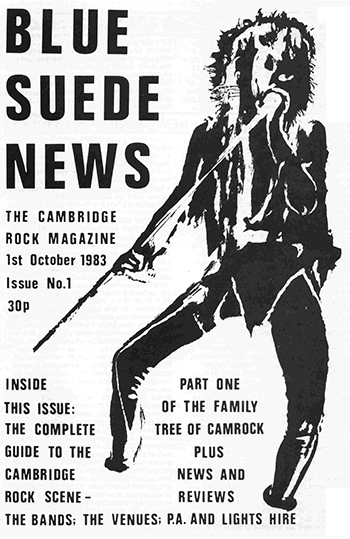Ruthie Collins lifts the lid on the punk scene in the city
“What you’ve got to remember about punk is that it isn’t about art or music; it’s a state of mind,” says Jonny Loathsome, artist and performance poet, of its spirit. Punk might be famous for its standout style, but punk as a movement is not just about fashion or provocative shock tactics. “It’s about embracing who you are as an individual – don’t be forced to live a lie by conforming to social pressure,” says Shane, a punk fan and Cambridge artist.
“We counted about 500 punks in the city. We were fighting for equality – a lot of gay rights, women’s rights, which punk fought for and won. It was a licence to be outwardly angry and not have it any more,” remembers Kretin, a punk in Cambridge in the early 80s, when Captain Sensible’s backing singers, post-punk band Dolly Mixture, still lived on De Freville Avenue. Back then, Cambridge had more squats, grotty pubs and makeshift spaces where you could watch gigs – like the Sea Cadets’ premises next to the Museum of Technology – than official venues.
“It’s about doing everything you can do yourself, your own band, your own scene”
Talking to punks who remember the city then digs up stories of riots, rebellion and a fight back against all kinds of oppression: from an anti-school protest led by school children, to Cambridge’s infamous ‘disco night’ at Thakes Cycle Shop on East Road. The stuff of local legend, the Thakes ‘riot’, which was contained by 13 police vans, was part of a broader venting of frustration at the need for more music venues in the city and one that eventually campaigned for what’s now Cambridge Junction, a leading performing arts venue.
“There was a pub, Lord Byron, at Cambridge train station where we’d meet in the 80s. A lot of the punks out in the villages might have been the only ones, so with Cambridge being the nearest city, they’d all leap on the train to meet other punks – and that was a great place to hang out,” describes Jonny Loathsome. “Pubs like the Cambridge Arms [now d’Arrys] on King Street were very punk in attitude. The music gave us confidence, kindred spirits. It’s the same today: if you have a certain type of spirit, it doesn’t matter where you come from, you’ll have that bond,” enthuses Louis, who was dual vocalist in band Death on the Streets.

Look around for it and modern-day punk in Cambridge is alive and kicking, with a clutch of bands such as ska-punk Dirty Stop-Outs, fronted by activist and alt-model Anna Knight. “We’re hoping this year we’ll be playing more gigs out of town and at festivals and bringing the community together through music,” says Anna.
“We are 100{b486c5a37ab2d325d17e17d701cb2567b1ecd1814e8ceb33effa2a4f1f171d46} not for profit, anti-fascist promoters,” says Laura Freestone, of Last Gang in Town, that she runs with husband Alec. “Inspired by the late Joe Strummer (The Clash), our first gig was a Strummerville benefit in 2003. It was supposed to be a one-off, but the rest is history…” Last Gang in Town also hosts and programmes the Devils Kicks Dancehall and Last Stand stages at Boomtown Fair festival. “We put on punk (the anarcho/crust/dub/street-punk, folk-punk and ska-punk side of punk!), ska, reggae, psychobilly and rockabilly bands.”
“The scene is much more organised now. Last Gang in Town has a huge following and is bringing national names to Cambridge, regularly. We didn’t have that back then,’” remembers Louis. “It does feel like there’s more cohesion in the scene, with Last Gang in Town and venues like the Corner House”, agrees Jonny Loathsome. “The pressures we were under back then are coming back now – today. Protest, the need to fight for equality, though, under Trump, it’s all coming back, too,” he adds.
Tim Neate, who runs the Scarecrow Corner at Strawberry Fair, describes how the DIY spirit there has never really gone away, continuing to grow ‘roots and community’. Those looking for punk, or the tools to make things happen for themselves, wanting to create change, can find a real sense of home at the festival, where you can find a tree circle, community and campaign stalls and a solar-powered stage. Captain Ruin, a punk artist from Australia, noticed it when he came. “There’s whole generations grown out of the scene here. But that’s what it’s about – it’s about family.” “We’ve got it all here,” Tim laughs.
Cambridge artist and punk fan Shane describes the DIY principle behind punk. “It’s about doing everything you can do yourself: create your own band, create your own scene, create your own indie label, customise/make your clothes to express your individuality, make your own art, make the things you need and grow things you eat.”
For anyone looking for punk in the city, embracing this DIY culture yourself, getting active and involved, seems like one of the best way to find it.

